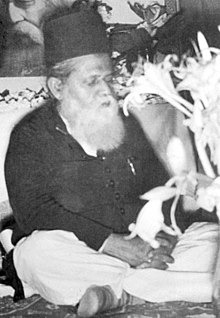Muhammad Shahidullah
This article needs additional citations for verification. (August 2016) |
Muhammad Shahidullah | |
|---|---|
মুহম্মদ শহীদুল্লাহ | |
 Shahidullah in a literary conference in Curzon Hall, Dhaka (April 1954) | |
| Born | 10 July 1885 |
| Died | 13 July 1969 (aged 84) Dhaka, East Pakistan, Pakistan |
| Education | Ph.D. |
| Alma mater | |
| Occupation(s) | educationist, writer, philologist and linguist |
| Spouse | Marguba Khatun |
| Children | Murtaja Baseer |
| Awards | Chevalier De L'Ordre des Arts et des Lettres (1967) Independence Day Award (1980) |
Muhammad Shahidullah (10 July 1885 – 13 July 1969)[1] was a Bengali educationist, writer, philologist and linguist.[2][3] In 2004, BBC Bengali Language Service placed him at number 16 on its list of "The Greatest Bengalis of All Time".[4]
Early life and education

Shahidullah was born in Peyara village, 24 Pargana, West Bengal (now in India). His father, Mafizuddin Ahmed, was a warden of a shrine. Shahidullah passed his school final Entrance exam in 1904 from Howrah Zila School. In 1906 he passed the FA exam from Presidency College in Kolkata. He received the Bachelor of Arts degree with Honors in Sanskrit in 1910 from City College, Kolkata, and Master of Arts in 1912 in Comparative Philology from the University of Calcutta. He earned his PhD degree from Sorbonne University in 1928 for his research on the dialects of the Charyapada.[1] He was the first Indian Muslim to receive this doctorate degree.
Career
Shahidullah began teaching in Jessore Zila School in 1908. After working as the Headmaster of Sitakunda High School for some time in 1914, he started to practice law at Bashirhat in 24 Parganas. He was elected Vice-Chairman of the town's municipality. Later, he worked as Sharatchandra Lahiri Research Fellow (1919–21) under Dinesh Chandra Sen at the University of Calcutta and joined the University of Dhaka as a Lecturer in 1921 in Sanskrit and Bangla.
During his period at the University of Dhaka he did research on the origins of the Bengali language. In 1925, he presented his thesis that Bangla as a language originated from Gaudi or Magadhi Prakrit. He was a principal of Govt A. H. college, Bogra from July 1944 to October 1948.[citation needed]
Family and legacy
Shahidullah had seven sons and two daughters. His third son A.K.M. Zakiyullah established a school named Dr. Shahidullah Gyanpith in Old Dhaka and a research library named Dr. Shahidullah Memorial Library and Language Research Center in Mirpur, Dhaka. One of his sons, Abul Bayan M. Naqiyyullah, studied in George Washington University in Washington, DC. Another son Murtaja Baseer is a painter. A dormitory in University of Dhaka, Shahidullah Hall, was named after him. One of his sons-in-law, Serajul Huq, eventually became a Professor Emeritus at the University of Dhaka.
Awards
Shahidullah received the award of Pride of Performance by the Pakistan government. He was also awarded Chevalier De L'Ordre des Arts et des Lettres by the French government in 1967 for his research on language and literature.[1]

References
- ^ a b c Badiuzzaman (2012). "Shahidullah, Muhammad". In Sirajul Islam and Ahmed A. Jamal (ed.). Banglapedia: National Encyclopedia of Bangladesh (Second ed.). Asiatic Society of Bangladesh.
- ^ University of Rajshahi
- ^ "Remembering a luminary: Bangla Academy celebrates Shahidullah's birth anniversary". The Daily Star. July 2014.
- ^ Reece Jones (June 2008). "Searching for the greatest Bengali: The BBC and shifting identity categories in South Asia" (PDF). National Identities. Routledge. Retrieved 25 August 2016.
- 1885 births
- 1969 deaths
- Presidency University, Kolkata alumni
- Translators of Omar Khayyám
- Linguists from Bengal
- 20th-century Indian linguists
- Pakistani linguists
- University of Dhaka faculty
- University of Calcutta alumni
- University of Paris alumni
- Recipients of the Pride of Performance
- City College, Kolkata alumni
- Recipients of the Independence Day Award
- Chevaliers of the Ordre des Arts et des Lettres
